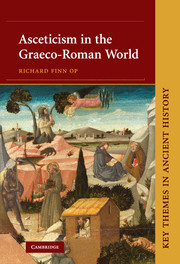Book contents
3 - Christian asceticism before Origen
Published online by Cambridge University Press: 22 January 2010
Summary
Study of pagan and Jewish asceticism has taught us that asceticism can be variously practised and understood. The asceticism portrayed in literary texts is not a simple window on what actually happened, nor a sure guide to how practitioners understood their ascetic acts. Furthermore, we have seen the influence of Greek Neoplatonist asceticism on Jewish Hellenistic thought. What influence, then, would Graeco-Roman and Jewish beliefs have on nascent Christianity? How would Christians use abstention from food and sexual relations? By approaching these questions from the perspective of common fasting, we shall see how indebted early Christianity was to Judaism in this respect, though we shall also see its wish to deny that debt. Fasting became a powerful means of distinguishing Christians from Jews and of defining different Christian groups. On turning to sexual restraint we shall see a distinctive practice of permanent renunciation which was widely advocated by appeal to a cluster of New Testament texts, but which was variously related to baptism and accompanied by differing accounts of marriage. In text and life the sexually abstinent, widows and virgins, made for groups within the Church which together displayed the life of heaven. Finally, we shall see the degree to which a highly educated Christian, Clement of Alexandria, was drawn (like Philo and to some extent by Philo) to re-cast popular ascetic practices within a Greek philosophical frame.
MOURNING SET IN STONE
At Rome, early in the third century ad, two calendars were carved prominently on the sides of a stone statue of a seated figure, while the monument was inscribed elsewhere with the titles of various theological treatises.
- Type
- Chapter
- Information
- Asceticism in the Graeco-Roman World , pp. 58 - 99Publisher: Cambridge University PressPrint publication year: 2009



